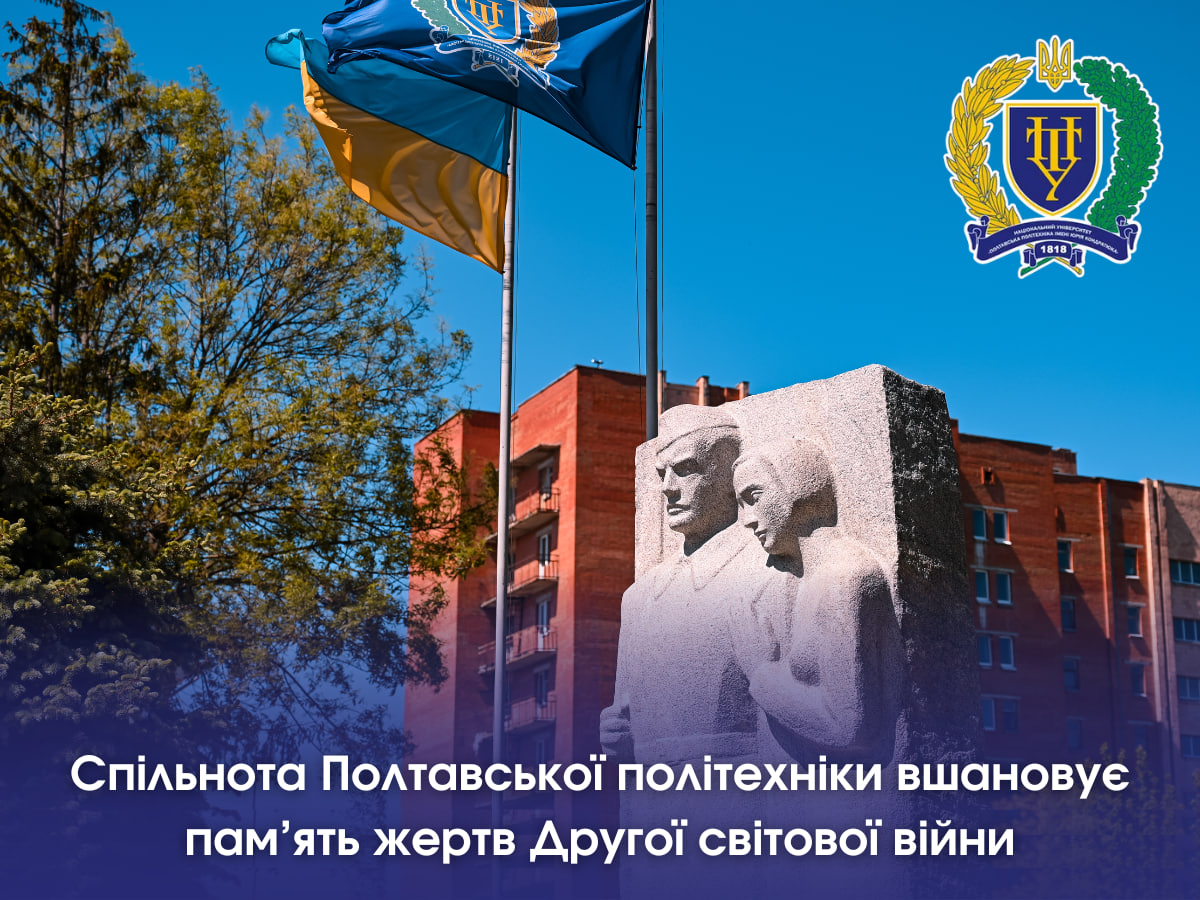This day has a special meaning for humanity, as it reminds us of the feat of millions of people who defended the world against Nazism. We remember not only the military but also the civilians who became victims of the war.
On this memorable date, National University “Yuri Kondratyuk Poltava Polytechnic” honours the heroes and celebrates the importance of peace.
On this day, we commemorate all those who fought against Nazism, as well as the peaceful civilians who died or suffered from the fighting and the occupation of their cities and villages, the children of war, and the forced labour.
World War II covered a large part of the globe. It involved 61 countries, and hostilities took place on the territory of about 40 states in different regions: Europe, North Africa, Asia and the Pacific. According to various estimates, between 50 and 85 million people died in the war.
Ukrainians, fighting on the side of the anti-Hitler coalition, made a significant contribution to the victory over Nazism and its allies. Millions of Ukrainians took weapons and fought in various armies around the world, as well as hundreds of thousands of people took part in underground and insurgent movements. Almost all Ukrainian enterprises were re-profiled for defence purposes. The Ukrainian territory was one of the main theatres of war, where large-scale battles and fierce resistance took place.
At the beginning of World War II, our university was evacuated to Western Kazakhstan.
267 students, faculty and staff of the university fought on the fronts of World War II.
Despite the evacuation and the war, the university trained more than 2000 civil engineers in six years, most of whom were sent to the active army.
Students who went to distant Kazakhstan continued their studies and after classes helped to care for the wounded in the hospital, cleared snow drifts, collected warm clothes from the population, prepared gifts for the wounded, and participated in amateur performances.
On 19 October 1943, after the liberation of Poltava, the university staff returned to their hometown, which was in shambles. The central academic building, an architectural monument, and the university’s residential buildings were destroyed. During the years of the terrible hard times, the university suffered damage totalling more than 6 million carbovanets (in the prices of those years).
During the occupation of Ukraine, both totalitarian regimes committed numerous crimes against the civilian population, including the Holocaust, mass murder, and deportations. Ukrainian losses in World War II amounted to approximately 8 million people, of whom 5 million were civilians and 3 million were military.
At the beginning of the war, the Ukrainian people, without an independent state of their own, were divided among several countries. The totalitarian regimes used the unresolved “Ukrainian question” and Ukrainians’ desire for sovereignty in their own interests and geopolitical manipulations. They viewed Ukrainian lands as a source of resources.
World War II was made possible by the collusion of inhumane regimes – the Nazi and Communist regimes, as well as by the hypocritical “policy of appeasement” pursued by the world’s leading countries towards Hitler. It is important to remember that the weakness, fear and indecision of the international community encouraged the aggressors to commit more crimes. Today, the international community can learn lessons from that tragedy to take adequate security measures, especially in the context of russia’s aggression against Ukraine.
World War II lasted for six years. The victory over Nazism was achieved through the concentration of all resources, mutual assistance, consolidation and mobilisation of society, as well as the solidarity of peoples and the complete reorientation of the economy, politics and social life to fight evil. This story shows how communities can come together to achieve important victories.
Today, the heir to Stalin’s regime, the russian federation, is trying to claim victory over Nazism by manipulating its population and intimidating the world. No single country can claim an exclusive role in the victory over Nazism; it was the result of the joint efforts of dozens of countries and hundreds of peoples. Any attempt to use the victory in World War II to justify aggressive policies is unacceptable. The culmination of russia’s aggressive policy was the attack on Ukraine in 2014 and the full-scale invasion on 24 February 2022.
Ukrainians are now defending Europe with weapons in their hands in order to give us a chance to build a more lasting peace and create a new, fairer global security system. The only way to achieve this is to defeat the aggressor, restore Ukraine’s territorial integrity and ensure that russian imperialism no longer threatens any country. Today, in the face of aggression, recovery is possible only through victory over the invader.
The Day of Remembrance and Victory over Nazism reminds us that we are all part of a large global community that strives for peace and security.
The memory of the war should not lead to the cult of victory, but to the development of the ability to value peace, to defend it categorically and uncompromisingly by all reasonable means, as well as to foster courage and integrity in the fight against aggression and injustice.
Poltava Polytechnic supports its students in their active citizenship, volunteering, participation in events that promote peace and help those who survived the war.
We honour the memory of the heroes of previous generations and make our contribution to the support of peace and democracy. Only together can we ensure a brighter future for all generations.



